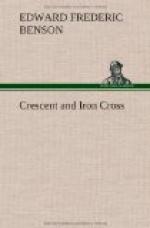Among the first tasks with regard to the Arabs that faced the Nationalist party from what we may call the pacific side of their mission was to substitute the Turkish language for Arabic. Kemal Bey, a Nationalist of Salonika, with the help of Ziya Bey, collected round him a group of young writers, and these proceeded to translate the Koran out of Arabic into Turkish, and to publish the prayers for the Caliphate in their own language, and orders went out that these revised versions should be used in all mosques. Turkish was to be the official language for use in all public proclamations, and, with Prussian thoroughness, it was even substituted on such railway tickets as had hitherto been printed in Arabic. The new Turkish tongue (Yeni Lisan) had also to be purged of all foreign words, but here some difficulty was experienced, for Persian and Arabic formed an enormous percentage in the language as hitherto employed, and the promoters of this Ottoman purity of tongue found themselves left with a very jejune instrument for the rhapsodies of their patriotic aims. Poets in especial (for the Nationalists, like all well-equipped founders of romantic movements, had their bards) found themselves in sore straits owing to the limited vocabulary; and we read of one, Mehmed Emin Bey, who was forced to publish his odes in small provincial papers, since no well-established journal would admit so scrannel an expression of views however exalted.[1] But the translation of the Koran was the greatest linguistic feat, and Tekin Alp, the most prominent exponent of Nationalism, refers to it as one of the noblest tasks undertaken by the new movement. It mattered not at all that by religious ordinance the translation of the Koran into any other tongue was a sin. ‘The Nationalists,’ he tells us, ’have cut themselves off from the superstitious prejudice.’ A further attempt was made to substitute Turkish letters for Arabic letters in the alphabet, but this seems to have presented insuperable difficulties, and I gather that it has been abandoned.
[Footnote 1: This thwarted poet retired from the Committee of Union and Progress not long after, and his place was taken by Enver.]




